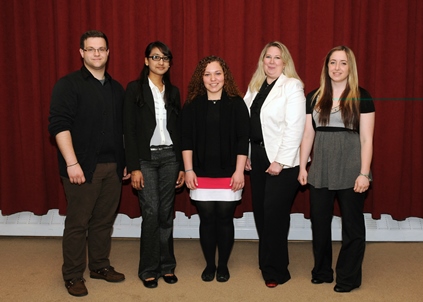Thursday, Oct 24, 2013
The program encourages and awards excellence in independent student research and scholarship
by David J. Pavlak
Five undergraduate students have been selected as the recipients for the 2013-14 Undergraduate Research Scholarship Award (URSA). These students will be researching topics in the field of Art, Psychology, Business and Biochemistry.
The Undergraduate Research Scholar Awards program was established in 2003-04 to encourage and award excellence in independent student research and scholarship, to enhance collaborative work between students and faculty, and to heighten the intellectual atmosphere on campus. Students are selected from the school of Business Administration, Liberal Arts and Sciences, Education, the College of Continuing Studies and the Westminster College of the Arts.
Students are awarded a $5,000 research scholarship to aid in their study and work with a faculty adviser throughout the duration of the year.
The five students selected as URSA recipients are:
Amanda Bertram, ’14, Psychology major
“Factor Analysis of Expectations and Agreement with Steps 1-3 of a Twelve-Step Recovery Program”
Bertram will be looking at how expectations effect participation in and personal conceptualizations of steps one through three of a Twelve Steps Recovery Program.
Bertram is under the advisement of Dr. Gary Brosvic, professor of Psychology, and said that this topic is of interest to her because of her past experiences. “My grandfather was a pioneer of AA. From personal experiences with family members who had alcoholism, it just seemed to correlate. One of the main components of the research is going to Alcoholic Anonymous meetings, so I attend the meetings three or four times a week.”
Sara Hartigan, ’14, Psychology major and Law and Justice minor
“Sentiment in the Courtroom: Effects of Attorney Emotion During Closing Arguments on Juror Decision-Making”
Hartigan is under the advisement of Dr. Wendy Heath, professor of Psychology. For her research, Hartigan said, “I am looking at the different factors that go into jury decision-making. What kind of extra legal characteristics, meaning things that aren’t allowed in the legal system, biases or anything that could prejudice a jury that could make them decide a verdict on something other than the facts of the case.”
Hartigan credits Heath for her interest in the subject. “I was a general psych major and I took a Psych and Law class with Dr. Heath,” she explained. “That subset of psychology and anything pertaining to psych and law captivated my attention. I started focusing my classes on it, adding a criminal justice minor, and then I looked into Dr. Heath’s research and it was something I thought was fascinating.”
Farzana Razack, ’14, Economics major and Health Administration minor
“The Geographic Distribution of Physicians in the United States”
Razack will be looking into the geographic distribution of physicians across the United States, specifically on the distribution of physicians in rural areas because they tend to be underserved.
“There is a general problem with rural areas being underserved,” Razack said about her research. “It’s also tied together with the Affordable Care Act and the new provisions that might cause doctors to go to different areas. I’m trying to suggest policies, so right now we are just working on making a solid hypothesis.”
Razack is under the advisement of Dr. William Amadio, professor of Information Systems and Supply Chain Management.
Oleksandra Dorosheva, ’15, Biochemistry major and Law and Justice minor
“Determination of a Role for Gβγ in the Cell Cycle Progression in Human Cells”
Under the advisement of Dr. Bryan Spiegelberg, assistant professor of Chemistry, Biochemistry and Physics, Dorosheva will look into the cellular localization of Gβγ and physical association with the mitotic spindle as human cells undergo mitosis to investigate a role for Gβγ in the mammalian cell cycle.
Dorosheva praised Spiegelberg for his assistance during the research process. “He guides me and helps me to find what the next step is until we get the synchronized cells for a specific part of the experiment.”
Louis A. Esposito, ’15, Fine Arts major
“Body of Work: Work on the Body”
Esposito will be looking at the twentieth-century artist Balthus in his research.
“Since I’m a Fine Arts major, its crucial for me to find sources of influential painters of the past,” Esposito said. “The one artist that I have attached to, his art is considered controversial, so my project is to deeply understand why his work was considered controversial since he used female nudes that were underage. I am trying to analyze why he used them and why his use of them weren’t for a sexual abusive way, but rather a psychological way. I take all that I’ve seen in his work and put it back into my work in the studio.”
Esposito is under the advisement of Deborah Rosenthal, professor of Fine Arts.
To be considered as a 2014-15 URSA Scholar, applications are due March 28, 2014. For more information about the program, students are encouraged to contact Dr. Brooke Hunter, Associate Professor in the Department of History, and URSA Chair, at 609-896-5378 or bhunter@rider.edu.

